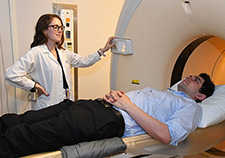Office of Research & Development |
 |


The study will examine the effects of atorvastatin on participant’s mental and cardiovascular health. ©iStock/clubfoto
March 18, 2024
By Tristan Horrom
VA Research Communications
"VA is a great place to do this kind of study. Many Veterans are happy to participate when asked. Most of the participants at our site seem motivated by a desire to help their fellow Veterans."
More than 50 VA sites are participating in a landmark clinical trial on the effects of statins on cardiovascular health, disability, death, and dementia risk in people older than 75.
While statins – medications that lower cholesterol levels – are known to reduce the risk of cardiovascular events like heart attacks and strokes in people up to 75 years old, limited evidence exists on whether statins are useful for those who are older. While many people over 75 take statins, most of those have prior diagnoses of high cholesterol levels or cardiovascular problems. Less is known about the benefits of older people beginning statin treatment for the first time. This has led to unclear guidelines, and clinicians extrapolating findings from studies of younger patients to make decisions about prescribing statins for their older patients.

VA study reveals dementia risks unique to people with African ancestry

Head trauma, PTSD may increase genetic variant's impact on Alzheimer's risk

VA-led research finds PET scans important for ruling out Alzheimer's disease
To fill this knowledge gap, Duke University launched the Pragmatic Evaluation of Events and Benefits of Lipid-lowering in Older Adults trial. The study is recruiting participants from about 100 sites across the United States, more than half of which are VA medical centers.
“Do statin drugs prevent death, dementia, and disability in older adults without known atherosclerotic vascular disease? There is good reason to think they may,” said Dr. James Walsh, principal investigator at the Richard L. Roudebush VA Medical Center in Indianapolis. “Unfortunately, adults over 75 are poorly represented in statin studies to date. This study will fill that gap. Many of the Veterans we serve are over 75, and the outcomes we are looking at are prevalent in that group. So this study is obviously important to Veterans.”
The study began recruiting in 2019 but was slowed down by the COVID-19 pandemic. Now, about 10,000 participants have been enrolled, with a target of 20,000 total participants. Community-dwelling adults at least 75 years old without cardiovascular disease or dementia will take the medication atorvastatin, sold commercially as Lipitor, or a placebo and will be followed for up to five years. Researchers have set up a call center and a nationwide system of decentralized research staff to follow-up with participants annually, which will include screening for cognitive and physical function and electronic health record checks for cardiovascular events. The study will run through 2027.
Dr. Dennis Hall, the study’s principal investigator at the Bay Pines VA Health Care System in Florida, explained the importance of such a large study with participating sites across the country.
“Large study group size attempts to ensure that the results reflect the population at large,” he said. “For example, if a random group of 50 patients out of a group of 5,000 were given a new medication and compared to a group of 1,000 patients given the new medication, the latter group would be expected to be the more reflective of the underlying population.”
The Bay Pines VA has recruited about 50 participants so far, with a target of 100 total at that site. Hall said the VA is uniquely positioned to conduct such large-scale research projects as the nation’s largest integrated health care network.
“VA has historically played a large part in medical research due to the large patient population, known traits of Veterans to be willing to participate in novel research, and the VA’s affiliation with other academic medical facilities,” explained Hall. “VA has been involved in studies that have advanced the care of both Veterans and non-Veterans in cardiovascular health, cancer, combat injuries, mental health, and many other areas over the years.”
According to Hall, the researchers hypothesize a connection between lipid levels and dementia, meaning prescribing statins could lower dementia risk. Hall explained atherosclerosis caused by elevated cholesterol levels may compromise blood flow to the brain. For example, many people develop strokes because of a blockage in the carotid arteries or in the blood vessels of the brain proper. Additionally, atherosclerosis can cause blood vessels in any part of the body to rupture and compromise blood flow to the brain. This reduced blood flow to the brain can often lead to cognitive impairment.
Atherosclerotic cardiovascular disease is a disorder in which lipid-filled plaques develop in the vascular system. It is a progressive disorder most common in western cultures due to diet, personal habits such as tobacco use, diabetes, high blood pressure, and inactivity, as well as genetic predisposition.
Previous research has shown a link between a more active and healthy lifestyle and lower Alzheimer’s disease risk. The effect of atherosclerosis on cognitive impairment could help explain this connection.
The results of this trial could influence the management of both Veterans and non-Veterans diagnosed with dementia, as well as the prevention of dementia. Dementia has been identified as one of the leading causes of morbidity and mortality in the aging population. In the U.S. in 2011, approximately 4.5 million people over the age of 65 were living with dementia. It is projected by 2050 the number will rise to 13.8 million people.
“VA is a great place to do this kind of study,” said Walsh. “Many Veterans are happy to participate when asked. Most of the participants at our site seem motivated by a desire to help their fellow Veterans.”
Veterans interested in learning more about the study, including a list of all participating locations, should visit www.preventabletrial.org for more information.
VA Research Currents archives || Sign up for VA Research updates